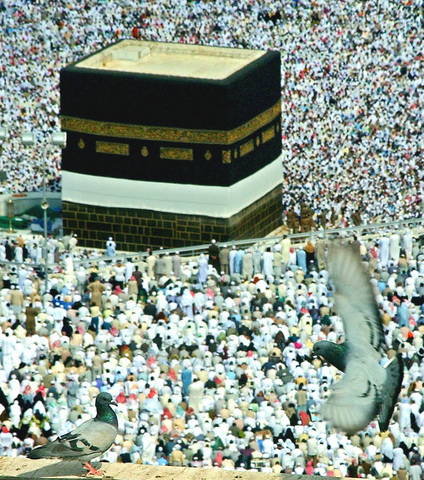Pilgrims streaming into Islam's holy city for the annual hajj prayed for the 157,000 people killed in last month's tsunami that devastated southern Asia, and asked God to give survivors the courage to cope.
The tragedy weighed heavy as the spiritual journey geared up, with Indonesia -- the world's most populous Muslim nation with 220 million people -- hit hardest. But 200,000 Indonesians, the country's quota, still were expected.

PHOTO: AP
One Indonesian man spoke Friday of his surprise over the dozens of strangers who noticed his nationality printed on the pouch around his neck, and approached to offer condolences for the more than 100,000 Indonesians who died Dec. 26. Another Indonesian found a quiet spot to pray for a lost friend.
Mohamed Saleh, a teacher from Jakarta stood outside the city's Grand Mosque and prayed, his hands raised and his eyes filled with tears.
"I have lost a friend in the tsunami, and I pray for him and the souls of all those that have perished," said Saleh, 50. "I pray that God will mend broken hearts and give them courage to overcome the grief."
Inside the mosque, pilgrims circled the kaaba, a cubic stone structure toward which Muslims turn for prayers five times a day. Pilgrims circle the kaaba to start and finish hajj rituals, which can be stretched over days but peak with prayers on Mount Arafat, where Islam's founding Prophet Muhammad delivered his final sermon.
Two million Muslims perform the pilgrimage each year, a once-in-a-lifetime duty of all able-bodied Muslims who can afford it. Many go repeatedly; it is believed to cleanse the soul and wipe away sin. By Friday, traffic into Mecca was bumper to bumper.
Security was high throughout Mecca, where Saudi officials try to prevent stampedes or other accidents as well as watch for possible terror attacks. At checkpoints several miles outside the holy city, officers stopped cars randomly, peering into trunks, shining mirrors to look for explosives in undercarriages and checking IDs.
The official Saudi Press Agency reported 5,849 reserve officers and police were helping keep order and manage traffic this hajj season. Saudi Health Minister Hamad al-Manie told reporters Thursday his ministry is watching for any signs of epidemics, particularly among pilgrims from tsunami-hit areas. Thus far, none have been spotted.
About 100 Indonesian women, walking together, many arm in arm, wore headscarves identifying them as from Aceh, the devastated northern region of Sumatra island.
None of them spoke English, but at the word "tsunami," several made wave-like gestures and gave looks of horror -- opening their eyes wide and covering their mouths with their hands. Others sighed deeply, before all melted into the crowd circling the kaaba.
Some of the pilgrims thanked Islamic countries for sending aid.
Abdullah Sharfuddin, 21, from Jakarta, praised Saudi generosity, noting the US$84 million raised for victims in a recent telethon, ``but we need to do more.''

Indonesia yesterday began enforcing its newly ratified penal code, replacing a Dutch-era criminal law that had governed the country for more than 80 years and marking a major shift in its legal landscape. Since proclaiming independence in 1945, the Southeast Asian country had continued to operate under a colonial framework widely criticized as outdated and misaligned with Indonesia’s social values. Efforts to revise the code stalled for decades as lawmakers debated how to balance human rights, religious norms and local traditions in the world’s most populous Muslim-majority nation. The 345-page Indonesian Penal Code, known as the KUHP, was passed in 2022. It

‘DISRESPECTFUL’: Katie Miller, the wife of Trump’s most influential adviser, drew ire by posting an image of Greenland in the colors of the US flag, captioning it ‘SOON’ US President Donald Trump on Sunday doubled down on his claim that Greenland should become part of the US, despite calls by the Danish prime minister to stop “threatening” the territory. Washington’s military intervention in Venezuela has reignited fears for Greenland, which Trump has repeatedly said he wants to annex, given its strategic location in the arctic. While aboard Air Force One en route to Washington, Trump reiterated the goal. “We need Greenland from the standpoint of national security, and Denmark is not going to be able to do it,” he said in response to a reporter’s question. “We’ll worry about Greenland in

PERILOUS JOURNEY: Over just a matter of days last month, about 1,600 Afghans who were at risk of perishing due to the cold weather were rescued in the mountains Habibullah set off from his home in western Afghanistan determined to find work in Iran, only for the 15-year-old to freeze to death while walking across the mountainous frontier. “He was forced to go, to bring food for the family,” his mother, Mah Jan, said at her mud home in Ghunjan village. “We have no food to eat, we have no clothes to wear. The house in which I live has no electricity, no water. I have no proper window, nothing to burn for heating,” she added, clutching a photograph of her son. Habibullah was one of at least 18 migrants who died

Russia early yesterday bombarded Ukraine, killing two people in the Kyiv region, authorities said on the eve of a diplomatic summit in France. A nationwide siren was issued just after midnight, while Ukraine’s military said air defenses were operating in several places. In the capital, a private medical facility caught fire as a result of the Russian strikes, killing one person and wounding three others, the State Emergency Service of Kyiv said. It released images of rescuers removing people on stretchers from a gutted building. Another pre-dawn attack on the neighboring city of Fastiv killed one man in his 70s, Kyiv Governor Mykola